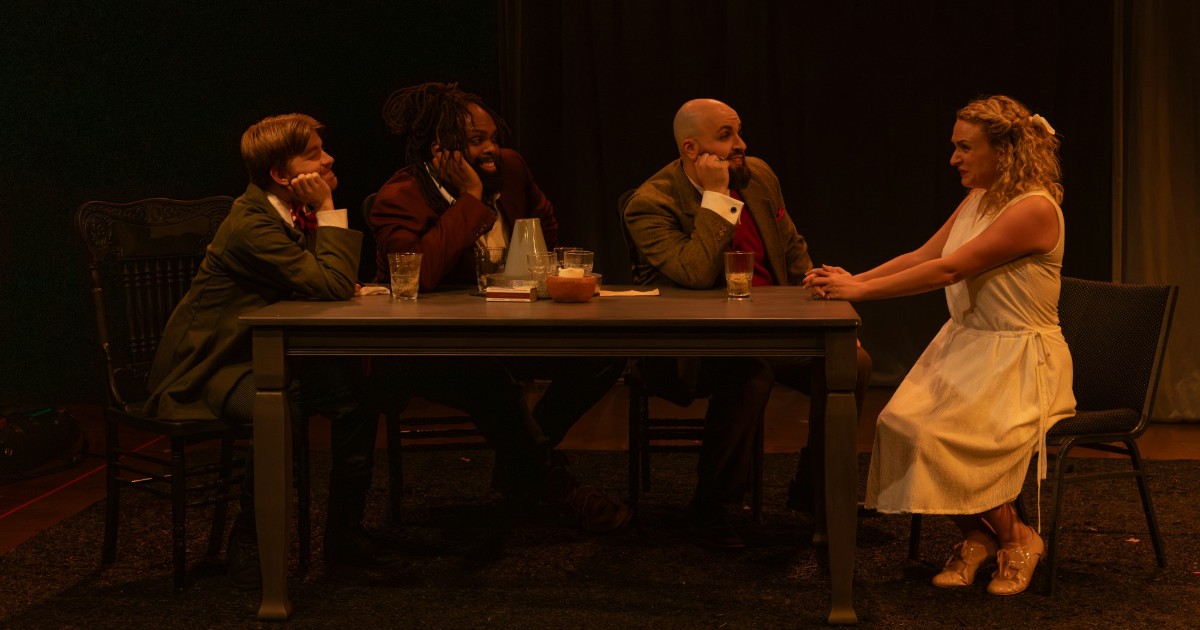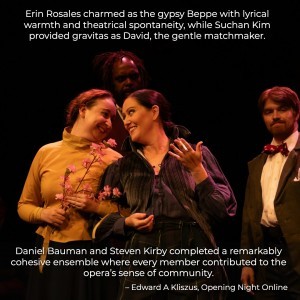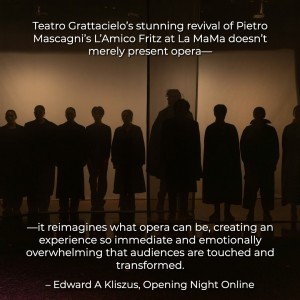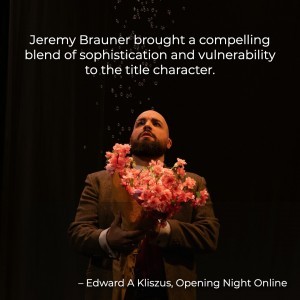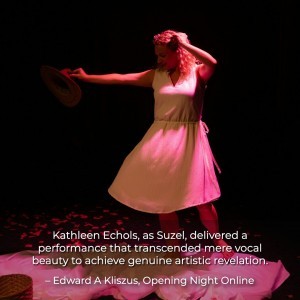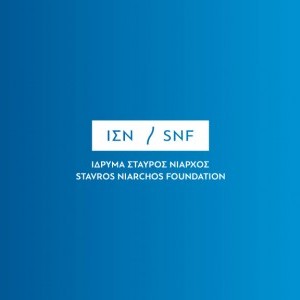From OPENING NIGHT ONLINE:
In an age of digital entertainment and virtual experiences, Teatro Grattacielo has rediscovered opera’s most powerful secret: the transformative magic that occurs when world-class vocal artistry meets audiences in spaces so intimate that every breath, every glance, every crystalline high note becomes a shared revelation.
Teatro Grattacielo’s stunning revival of Pietro Mascagni’s L’Amico Fritz at La MaMa doesn’t merely present opera—it reimagines what opera can be, creating an experience so immediate and emotionally overwhelming that audiences are touched and transformed. Teatro Grattacielo’s visionary approach offers something rarer than the finest vintage: the chance to witness how great music, in the hands of fearless artists, can reach across time to touch the deepest chambers of the human soul.
When one hears the name Pietro Mascagni, thoughts instantly turn to Cavalleria rusticana, the explosive verismo opera that launched his career. Yet L’Amico Fritz, his tender follow-up, remains overlooked—a pastoral meditation on love that couldn’t be further from Cavalleria’s fatal passions.
At La MaMa Experimental Theatre Club’s intimate Ellen Stewart Theatre, Teatro Grattacielo has brilliantly dusted off this treasure, revealing Mascagni’s gift for psychological subtlety in an environment where every musical nuance carries unprecedented immediacy.
Unlike the operatic tradition’s obsession with tragic endings (La traviata, Tosca, Lucia), L’Amico Fritz dares to conclude in contentment. Love blooms gradually, misunderstandings dissolve through communication, and remarkably, no one dies. In our contemporary age, this makes the opera a quietly revolutionary statement of joy and human possibility.
Under Andy Anderson’s precise and supple baton, the chamber orchestra, positioned on stage alongside the singers, transformed the entire theatrical experience. Without a traditional pit, every instrumental conversation became an audible revelation, with individual voices emerging in sparkling precision.
Violinist Sodam Kim particularly distinguished herself during the tender Cherry duet “Suzel, buon dì,” an exquisite pastoral scene where Fritz and Suzel pick cherries together. This duet is suffused with flirtation, innocence, and an undercurrent of burgeoning love. The solo violin here acts as a third character, weaving around the vocal lines with an elegant lyricism that mirrors the hesitant, delicate emotions neither character dares to voice overtly.
The violin’s phrases glide in conversation with the singers, often anticipating or echoing the vocal melody, creating a dialogue of its own that suggests what the lovers cannot yet articulate. The instrumental line is particularly significant in making the shimmering atmosphere of the orchard, a setting that Mascagni paints as much with sound as with scene.
Kim’s lyrical lines served as an additional dramatic voice while the audience witnessed her expressive face and graceful technique, transforming beautiful sound into a fully embodied musical experience.
Director Anna Laura Miszerak approached staging with a symbolist sensibility perfectly suited to the theater’s intimate dimensions. Rather than literalistic representation, she evoked emotional landscapes through meaningful gestures and subtle visual metaphors, creating an almost conversational relationship between performers and spectators, where moments of introspection felt genuinely private despite being observed.
Taylor Friel’s impressionistic set design, Will Rossiter’s mood-shaping lighting, and Angela Huff’s thoughtful costuming collectively conjured an ethereal world where personal transformation could unfold organically.
Kathleen Echols, as Suzel, delivered a performance that transcended mere vocal beauty to achieve genuine artistic revelation. Her crystalline soprano, warmly human in lower registers, proved ideally suited to both Mascagni’s melodic writing and the chamber acoustic environment.
In the intimate space, every subtle vocal color became magnified—the gentle vibrato suggesting Suzel’s youth, the steadying tone revealing wisdom, and luminous high notes floating directly into listeners’ hearts. Echols’ technical mastery served dramatic truth rather than ostentatious display.
Jeremy Brauner brought a compelling blend of sophistication and vulnerability to the title character, his tenor displaying a remarkable range of psychological depth. The intimate setting allowed audiences to witness Fritz’s transformation from a confirmed bachelor to a devoted lover through vocal choices that seemed to emerge spontaneously from genuine emotional discovery.
Erin Rosales charmed as the gypsy Beppe with lyrical warmth and theatrical spontaneity, while Suchan Kim provided gravitas as David, the gentle matchmaker. Daniel Bauman and Steven Kirby completed a remarkably cohesive ensemble where every member contributed to the opera’s sense of community.
The sublime Act II duet “Ah! ditela per me quella parola” represented the evening’s emotional zenith. Mascagni’s masterful restraint—creating intimate vulnerability rather than passionate outbursts—became even more potent in the chamber setting, where the orchestra’s hushed accompaniment felt like held breath as quiet phrases carried the force of whispered secrets.
Echols and Brauner’s voices intertwined with exquisite sensitivity, negotiating the delicate balance between restraint and confession like two hearts tracing the contours of vulnerability. The effect on the audience was palpable—listeners leaning forward unconsciously, drawn into the lovers’ intimate space, becoming participants rather than mere observers.
As final notes faded into silence, tears glistened in many eyes, knowing smiles passed between couples, and the kind of moved silence that indicates hearts genuinely touched by artistic truth filled the theater. This exemplified the unique power of chamber opera: when great music meets great singing in perfect intimacy, the result is transformational.
Beyond artistic achievements, this production of Pietro Mascagni’s L’Amico Fritz distinguished itself through Teatro Grattacielo’s environmental commitment. Under Jacquelyn Downey’s leadership, the team integrated eco-friendly materials, minimized waste, and ensured the repurposing of set pieces, proving that sustainable practices can enhance rather than compromise artistic vision.
The company’s dedication to reviving lesser-known operatic works provides a crucial counterbalance to the standard repertoire. Their willingness to champion forgotten masterpieces while committing to chamber forces offers a compelling model for opera’s future development.
The overwhelming audience response—extended ovations, lingering lobby conversations, and visible emotional impact—suggests a profound hunger for an immediate, personal operatic experience. In our digital age, live, intimate encounters between extraordinary vocal artists and audiences provide irreplaceable, transformative power.
Teatro Grattacielo continues this mission with an ambitious 2026 season, featuring the world premiere of Joseph Summer’s The Tempest and Ponte, commemorating America’s 250th anniversary—demonstrating an understanding that opera’s vitality depends on both preserving masterworks and nurturing new voices.
The tears in audience members’ eyes, animated discussions continuing into the New York night, and genuine transformation visible in listeners’ faces testified to a fundamental truth: when exceptional vocal artistry meets intimate presentation, serving great music and timeless themes, the result transcends entertainment to achieve something sacred.
In reclaiming L’Amico Fritz for contemporary audiences, Teatro Grattacielo reminds us that opera’s most significant power lies not in spectacle alone, but in its unmatched ability to make human hearts sing in recognition of their own most profound truths. This isn’t just opera—it’s an invitation to remember what it means to be fully, vulnerably, magnificently alive.
Teatro Grattacielo’s L’Amico Fritz is a masterclass in how joy, love, and gentle revelations can stir the soul as deeply as tragedy—an essential rediscovery rendered with care, creativity, and an abiding respect for operatic heritage.

